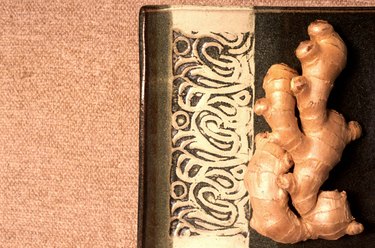
Ginger has long been used as an anti-inflammatory agent and aid to digestion. Some studies suggest it can reduce the nausea associated with morning sickness, chemotherapy and motion sickness. Ginger in capsule form has few side effects, according to the Mayo Clinic, but dosage should be limited to no more than 4 g per day, no matter what form you use. Tell your doctor if you are taking ginger or other supplements, as they may interact with prescription medications. Also, because the FDA doesn't regulate supplements, be sure to purchase your product from a reliable manufacturer.
Gastrointestinal, Heart and Other Internal Effects
Video of the Day
Although ginger is generally known as a digestive aid, it can cause mild heartburn, bloating, gas or diarrhea. Some people experience burping or a burning sensation in their mouths, though this is less likely when taking ginger in capsule form. Avoid taking ginger if you have gallstones, as it may worsen symptoms and cause more pain.
Video of the Day
Ginger may also lower blood sugar, so if you have diabetes, be cautious about using it, especially in combination with other herbs or supplements that affect your glucose levels.
Some research indicates ginger may lower blood pressure or interact negatively with certain heart medicines, so if you have either of these conditions, talk to your doctor before adding a ginger supplement to your diet.
Blood-Thinning Effects
Ginger is thought to slow blood clotting, so health-care specialists recommend against using it if you have any kind of bleeding disorder. Talk to your doctor before adding a ginger capsule supplement if you are taking prescription blood thinners, and avoid or limit the use of ginger if you are using over-the-counter or herbal supplements that slow blood clotting. Some common prescription blood-thinning drugs are warfarin, Fragmin, Lovenox and heparin. Some common OTC blood-thinning drugs are aspirin, ibuprofen and naproxen.
Effects During Pregnancy
Taken in limited doses, ginger may lessen the effects of morning sickness. According to the herbal safety guidelines of the pharmacy program at the University of Texas, El Paso, the effect of ginger on fetuses has been the subject of only one study. While no harmful effects were found, you should still take care when using this supplement. These herb guidelines say 4 g of ginger a day is the maximum dose, but the University of Maryland Medical Center recommends taking only 1 g per day for no more than four consecutive days to counter the nausea and vomiting of morning sickness.
The effect of ginger on infants hasn't been fully studied, either, so if you're breast-feeding your baby, talk to your doctor before using this supplement.